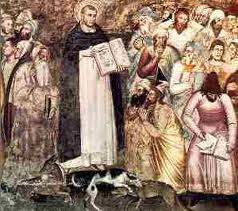The Feast of the Translation of St. Dominic is certainly a good occasion for us to pause and ask ourselves what this day means for us, the sons and daughters of our Holy Father St. Dominic.
 In 1221 our Holy Father St. Dominic died and was buried under the floor of the friars’ Church of St. Nicholas in Bologna.  The friars were so engrossed with their work of preaching that they did not bother with such a simple burial place for such a great saint! On the other hand, the members of the faithful would go to the church to pray day and night at the tomb of Dominic.
They tried to adorn the tomb and some friars were greatly bothered by this. In the next few years the community grew in numbers and the church was too small so a new church was built. The new design left Dominic’s burial site outdoors subject to rain and the natural elements. The friars who lived with Dominic were distressed to see his tomb left in such a poor area.
Meanwhile a great revival of preaching was taking place in Lombardy. Both the Dominicans and the Franciscans were involved in this work. The Franciscans were zealous in preaching the virtues of their canonized Founder, Francis and their brother Anthony of Padua. Francis had been named a saint only two years after his death, and Anthony in just one year. This prompted the Dominicans to do something about Dominic.
In 1233 before the General Chapter, Jordan of Saxony, Master of the Order of Preachers and Dominic’s successor, agreed that the tomb of Dominic would be opened and the body to be moved to a more fitting place in the new church. But this decision caused great tension.
Would the friars find evidence of sanctity? What about the people who had been venerating Dominic ? Furthermore, this matter would have to be made public and would involve notification to the public authorities and to the Pope.
Friar Ventura, prior of the community at Bologna, relates the following, which was presented, as his testimony for the canonization of Dominic. The report begins with the year that Dominic died:
“ That year everybody noticed an extraordinary fragrance in the whole church, especially near the tomb, and the witness in particular says that he noticed it himself. There were also a lot of miracles worked that year and in the following years for people who came to the tomb of the blessed Dominic bringing was images and all of things. When several people tried to present silk cloths to cover the tomb of blessed Dominic, the brethren would not allow them to do so, for fear they would be accused of greed.
When the body of the blessed Dominic was due to be moved, for several days, many noble citizens guarded it to prevent it from being stolen. When the tomb was opened, in the presence of many citizens of Bologna and other noble men, including religious, bishops and laymen, the brethren found a wooden coffin, shut with iron nails, and such a sweet smell came out that they were all amazed, saying that they had never smelled anything like it. So the tomb, and the extraordinary fragrance remained the whole time. Master Jordan of Saxony held the holy body in his hands and gave it to the three hundred or so brethren who had come to the General Chapter to kiss.  When the witness was asked how he knew all this, he said that he was present at all of it.
Friar Ventura ends his memories recalling Dominic’s charity. Jordan of Saxony concludes his “little book†On the Beginnings of the Order of Preachers describing Dominic’s charity. Dominic himself ended his life speaking to his brothers about charity: “Have charity for one anotherâ€
It is really this heroic charity of our Father Dominic that points to the deepest reason that we celebrate this Feast Day. It was charity that drew the humble to his grave in death. It was his preaching and the example of his life, lived in charity that attracted men in record numbers to the Order of Preachers in his life. Today, it is the holiness of St. Dominic, and his charity that we proclaim, and with all humility try to imitate, and May we also remember those words spoken of him: “He spoke only TO God, or ABOUT God.â€
FR. LIONEL XAVIER, OP

